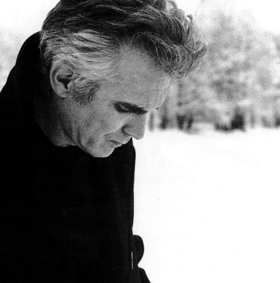
Johnny Dowd sings -- and raps, and rasps, and moans, and cruelly whispers -- about outlaw riders and midnight murder. The country blues tunes, from his debut Wrong Side of Memphis and the new Pictures From Life's Other Side, swell with hell-haunted Vietnam veterans, suicidal death-row convicts, and that Old Testament vision of woman as essentially a temptress.
Dowd, who looks like Harrison Ford's bad daddy and sounds a little like King of the Hill's Dale Gribble, spent 20-odd years writing songs while he made a living shuffling furniture around Ithaca, New York. Pushing 50, he finally took his guitar and four-track and cut Wrong Side of Memphis mostly by his lonesome; this lends an eerie, insular air to his cries of "Pal-ay some guitar, Johnny, play it for me!" Two years and another album later, he's become a genuine cult figure -- but his main concern over touring is still the inevitability of finishing in the red.
I steeled myself to interview the man as best I could, breaking up with my girlfriend, imbibing to stumble-drunkness every night over more than a fortnight, and riddling askjeeves.com with such puzzlers as "I want to die now. How can you help me?" Over the phone, though, Dowd comes through as surprisingly level-headed -- and handy with the dry humor which infuses his music.
Dowd has been a traveling man all his life. Born in Texas, he grew up in Oklahoma and Tennessee. He joined the army at age 19, got out four years later and "mostly just traveled around a lot; lived in Georgia for awhile, New York for awhile, Southern California for quite awhile -- it was that era." His songwriting started up about the same time as his moving business, and he wrote "two or three songs a day, except they were all basically the same song, the same riff, with different lyrics."
Pictures From Life's Other Side, unlike Memphis, reaps the harvest of a full band functioning as a bunched fist. Some of the moving parts are a zingy xylorimba; all-too-pure female counterpunches to Johnny's corrosive vocalizing; and rhythms apparently inflicted on scrap metal and kitchenware. "I bring my part of it, and they bring their part of it," Dowd explains. "I could be playing country-western, and they could be playing Sun Ra behind me. When it works it sounds like country-western and Sun Ra. 'Course, sometimes it sounds like four people playing four different songs at the same time."
Named, appropriately, for its Hank Williams title track, Pictures spelunks steadily into metaphysical darkness that may condemn even a corpse to lie awake and aware in its casket, listening for the maggots. "If love is a disease/Then you're the one that made me sick," offers one song; another, "Blood Evidence" cuts out after 45 seconds in a flurry of shuffling papers that might be mismatched lyric sheets. Or maybe it's the song's protagonist who, having admitted he picks up young girls for joyrides, knows he's said too much and thereafter takes the Fifth before the real blood evidence spills.
Like Lou Reed before him, Johnny feels no need to condemn his often-bereft and/or horrifying protagonists; he says his parents, along with the Bible, form the foundation for much of his material: "You try to see what male-female relationships are like, from your parents. Good and bad stuff, you know." I ask if any one thing broke his heart. He answers, "Probably one thing." Then, after several seconds of static, he continues, "I don't really wanna get into that." But he adds, making people sound like dinnerware that slipped and fell in the van: "I think everybody gets damaged. Broken, damaged, chipped, or whatever have you."
Asked why he's lived longer than did Hank Sr., obviously one of his idols, Dowd is pragmatic. "I don't abuse drugs and stuff to the extent Hank did. I haven't lived a musician's life, which tends to be an unhealthy lifestyle. You can't get drunk every night and be a mover, but of course if you're a musician you can be drunk all the time, and show up for an hour. If I'd have gotten recognition when I was 20, maybe I would've been dead when I was 30."
Not surprisingly, Dowd's a fan of that other great master of the Southern Gothic, writer Cormac McCarthy. He found a little of himself in McCarthy's The Orchard Keeper, and hopes folk will do the same with his material. "There's this guy who's living in a cave with this woman, and the woman's already been dead a week. But you can read this and say, 'Yeah, I could see myself. There but for the grace of God, that could be me.'"
Andrew Hamlin lives and works in Seattle, Washington, where he prays for the return of Doug Clark and His Hot Nuts.
